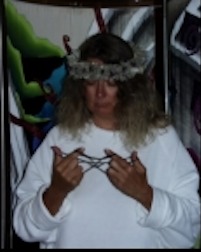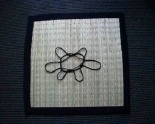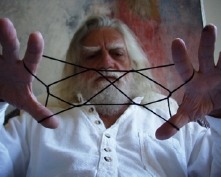
ABSTRACT
Are string figures just a child’s game? In this article, Lois Stokes asks you to consider the idea that "the world is what you think it is." Perhaps string figures are more, much more than child’s play.
INTRODUCTION
It has been said that the spirit of the string figures was a
guardian spirit of shaman. It is now the time for me to tell the story
of how I met this ancestral spirit and how my husband and I became
caretakers of a knowledge so ancient that it appeared to have been lost
and forever forgotten. We have been given a gift from the ancestors and
we want to acknowledge it as a living treasure and share its mystery
with you.
I do not really know what the ancient ones did with the string. I
was not there. But what I do know is that the string seemed to speak to
me and I listened. I was compelled to find out about string figures and
how they were once used. My research took on a life of its own as I sat
silently weaving ancient patterns with my fingers and a simple loop of
string.
String figures are found in almost all of the cultures of the
world: Africa, The Arctic, Australia, Japan, The Pacific Islands of
Micronesia, Melanesia, Polynesia, Among the indigenous cultures of North
America, Central and South America and throughout Europe, Asia, the
United States and the Middle East. They are very ancient. You may know a
version from your childhood called cat’s cradle.

In
Hawaii they are called Hei which on one level means to snare. Chants
and stories often accompany the making of the string figures. It is
difficult to know how much of the knowledge of the ancient ones has been
forgotten, adapted or concealed in the process of coming to us today.
Therefore the meanings of these chants and figures remain open to
interpretation. Each stanza might contain as many as five or more
different meanings. A literal meaning, a figurative meaning, a
historical or a legendary reference, a sexual meaning and a hidden
meaning. It is with great enjoyment when one can understand the depth of
these subtle and multiple meanings.
We must remember that the word holds power, especially the
spoken word. Names were not just given but carefully selected. Words
seem to have a power beyond mere communication. So in attempting to
understand the Hawaiian string figures one must pay attention to the
words as well as the patterns.
I have become aware of over 115 Hawaiian figures. Each pattern
has its own energy. They not only sound and look different but they feel
different. It was with this feeling sense that I stepped into a
different realm.
In my search to understand the meaning of the string figures I
had been studying astronomy, mathematics, physics, architecture,
philosophy, ethnology, anthropology, archeology, comparative religions,
healing and shamanism. I looked into the meaning of symbols and ritual,
the influence of energy, colors, number, geomancy, sound, shapes and
patterns. I’ve studied cosmology and myths and in particular the
culture, language and beliefs of Hawaii and Polynesia. People and books
would come my way to teach and inspire me. I tried to remain open to the
knowledge that came to me and yet leave open the book for the many
stories yet to hear.

There
came a day when I put the books aside and stepped out into the energy
of this sacred Island of Kauai. I would weave patterns with the string
as I sat by the ocean or by a mountain stream. I played string games
with the children and with the adults who took great delight in
remembering what was once forgotten. That is when the magic started to
happen and I knew without a doubt that the gift I was given was
significant. String figures were not just a child’s game but the tool of
a shaman. A tool for influencing relationships within the self, with
others and with the environment. A tool for restoring harmony. They had
been placed in the hands of the children so they would not be forgotten.
The spirit of the string figures had come to me so that I could retell a
story.
The Story
Children and Shaman – a playful conspiracy…
The story as it was told to me by the string started off as
children so often do, with a few questions which in turn led to even
more questions. I ask you now to journey to a space of wonderment and to
ask the question…
What If…
What if…string figures are more than just a children’s game?
What if…they were used to snare? And what did they snare?
What if…string figures connect ancient wisdom with modern times?
What if…string figures were used by the navigators?
What if…they had meanings related to the sun, moon and the
stars, to eclipses, zeniths and nadirs and to other natural phenomena of
the skies?
What if…they had meanings related to the teachings of the land and of the people who made them?
What if…they were a map. A means of giving and noting directions? Could they be used to help locate yourself in space?
What if…they retained numerical codes?
What if…they were used like the abacus or the quipus of Peru as a
recording device, to determine time, to tally and to add?
What if…they were used to measure star distances, wave motion, navigation distances and other forms of measurement?
What if…they had meanings related to the heiaus, alignments and to sacred space and sacred time?
What if…they were used as mnemonic devices to aid the remembering of genealogies and important teachings?
What if…they were an early form of secret written language?
What if…they were used for communication?
What if…they were used to teach and to tell the myths and legends?
What if…they were used as an entertainment event for storytelling and competition?
What if…they were given to the children as a game and the
children were watched as they played and their particular skills and
talents were noted for further training?
What if…the elders used string figures to test and train the
memory along with the other senses, so that the history and traditions
of the people could be preserved and passed on?
What if…they were used to generate mana, influence, power?
What if…the erotic chants and moving string figures were used to
increase the sexual power? Could they have been used to teach about
sex?
What if…string figures are alive, could they be fields of energy
and information? Instead of seeing the string as an object could we see
it as a package of information? Could you think of the string as a
bundle of consciousness rather than as a material object?
What if…they were used as an energy device, employing the harmonic frequencies of color, shape, movement and sound?
What if…they were a form of sacred geometry?
What if…they are thought structures. When people looked at a
certain figure, without knowing what they mean, images would come and
they would understand it?
What if…they help people think in a different way?
What if…they were used for divination?
What if…you could find a picture in the string, something that
is meaningful? What memories and experiences have passed into this
object and are reflected back to you? Can you see how your consciousness
transforms a lump of matter into a symbol of life experience?
What if…you could ask the string through its position and its vibration for any oracular guidance that may be needed?
What if…you could Grok the string pattern for answers to your questions?
What if…they could be used to illustrate shape shifting?
Indigenous cultures recognize that storytelling can reshape an
individuals experience or life story. Many shamans are gifted
storytellers and shape-shifters.
What if…they were used as a tool for manifestation?
What if…they were used for healing? Could the knots symbolize
the constriction, the illness and the removal of the knots as a release
from that illness?
What if…they held the power of the Mudras as they reveal the
hand energy looked at by the various traditions of Ayurveda, Chakras,
Acupressure, Reflex Zones, Meridians, Palmistry and Astrology.
What if…they can restructure the neurons in the brain? As the
environment changes our mental state, our way of thinking changes and so
too does the brain.
What if…changing patterns of string affect change in your vibrations and in your physical reality?
What if…string patterns affect your energy and then you affect the energy of what is being observed, healed or created?
What if…you could place a healing intent into the patterns of the string? Could they be used to create sacred art?
What if…they function as a meditation, relaxation device? Could
they help people free their thoughts and themselves from time and space?
What if…the manipulation of string accompanied by chants
facilitates imagery that is ritualistic and ceremonial in content?
What if…they were used in ritual?
What if…journeywork combined with the manipulation of string can
access the psychomythology, or imagery and memory work, within each
person which can support healing and help transform pathology?
What if…the journey and string figure technique may be an
ancient form of what we know today as a stress reduction technique as
well as a way of inducing a natural altered state?
What if…they were used as a pathway for the spirits and in
communication with the spirits, for soul retrieval, to make a journey?
What if…they were used in ritual for the passing on of the dead to the otherworlds?
What if…string figures were portals?
What if…they were used to trap and snare spirits?
What if…they were symbolic of life’s mysteries, the cosmic egg,
the world tree, A labyrinthine path, grandmother spider’s web? Could
they help us focus on the center and the journey to the sky and on the
earth and to the underworld? Could they symbolize our
interconnectedness?
What if…they contained the knowledge and power which lies beyond man through spiritual insight
What if…they can be used to remember the ancestors, to benefit from their powers, because that was the genetic past?
What if…they could be used to access the mind of the ancients?
What if…they were a prayer?
CONCLUSION
Lois & Earl Stokes are shaman and artists of the spirit
residing on the island of Kauai in Hawaii. They perform string figures
as a healing art and can be reached on the internet at stokes@lava.net.
They practice the Hawaiian Shamanic Healing Arts and live the
Huna and the Aloha Spirit of Hawaii. They are ordained Alaka’i of Huna
International.
They view string figures as a gift from The Ancestors and want
the children of this land to know the beauty of this living treasure.
ACKNOWLEDGEMENT
The thoughts in this article are not mine. I only asked the
question "What if…" The words belong to the keepers of this ancient
wisdom. Only some of whom I have acknowledged here. There are many more.
We are all connected to the ancient past and each one of us holds a
piece of the puzzle to this Divine Mystery. Our ancestors stand behind
us and they have given us a special gift. I was told to write down
everything that I heard or read that had some relationship with the
spirit of the string figures and that is what I did and I continue to
do.
Mahalo and blessings to the people whose words and thoughts were
inspiration to the creation of this work. The spirit of string figures
has brought them to my doorstep and in keeping with the belief that the
reciting of names gives the spirit power and brings them to the present
moment, I honor them with this name chant. For the academics, a complete
bibliography will be made available upon the completion of the book
from which this article is an outline or upon request at
stokes@lava.net.
To my ancestor spirits and the kumu’s (teachers) and kahunas who
have had an influence on my thinking, I visualize a waterfall. To Serge
Kahili King of Aloha International whose words I have studied and who
first published this work on his website at www.huna.org, I hold a lotus
blossom. To Francis X. Warther I send the warm tropic wind so that we
can hear the song of a navigator poet, To Rubellite Kawena Johnson,
Frank Kawaikapuokalani Hewett, Kahu Abraham Kawai’i, Ed Kaiwi, Alan
Alapai, Aunty Francis, Roberto Kaplan, Van James, and the Alaka’i of
Huna International, I hold a basket of seeds and petals. To the shaman
and the many people who have gathered on the sacred island of Kauai and
to their ancestor spirits, I give a symbol instead of a name… a
beautiful tapestry, woven with threads of many colors and textures. I
now call upon the authors of the many books and articles whom I have
connected with and to them I give a double rainbow which circles the
tropic sun.
A. Grove Day, A. Johnston Abraham, A. Makanani, Aban Wall,
Abraham Fornander, Adrienne L. Kaeppler, Albert Einstein, Albert von
Thimus, Alberto Bueno Mendoza, Alexander A. Gurshtein, Alfons L. Korn,
Alfred C. Haddon, Alfred Metraux, Al-Ghazall, Alice Thoms Vitale, Amos
P. Leib, Anders Ryman, Andrew J. Conklin–Peck, Andrew Neher, Angeles
Arrien, Ann Baring, Anna Walters, Anne Akers Johnson, Anne M. Chapman,
Anthony F. Aveni, Anthony Lawlor, Aristides Quintilianus, Aristotle,
Arlington H. Mallery, Armando M. Da Silva, Audrey Collinson Small,
Barbara O’Rand, Barbara Tedlock, Barry Fell, Ben Finney, Bernard Second,
Bertrand Russell, Billie Jean Isbell, Bob Westerveld, Bodo J. Baginski,
Boetius, C. A. Marchaj, C. Earle Smith Jr., Camilla Gryski, Carl G.
Jung, Caroline Curtis, Caroline Furness Jayne, Catherine C. Summers,
Catherine Kalama Becker, Cassandra Eason, Cecelia F. Klein, Charles H.
Hapgood, Christopher B. Donnan, Chuck Pettis, Claire R. Farrer, Craig
Morris, David Fideler, David Kalakaua, David Lewis, David MacLean Eaton,
David Malo, David Titus, Denise Schmandt-Besseratt, Dimiter Kolev,
Donald Sandner, Donald Stanley Marshall, Dov Baer, Duke Kalar i Wise, E.
S. Craighill Handy, Ed Lowell Hohn Bean, Edd Sterchi (Wakahana), Edmund
Leach, Edward Stasack, Elizabeth Wayland Barber, Elliott Carter, Erich
M. von Hornbostel, Ernest S. Dodge, Esther R. T. Mookini, Felix R.
Mindt-Paturi, Frank Coppieters, Frank R. Wilson, Franz Boas, Frederick
B. Wichman, Galileo, Gary Urton, Gelvin Stevenson, George F. Carter,
Germaine Dieterlen, Gertrud Hirschi, Giorgio de Santillana, Guy Massat,
H. C. Maude, H. E. Maude, Halley J. Cox, Hank Wesselman, Hans Jenny,
Hans Kayser, Harry & Elizabeth Helfman, Hazrat Inayat Khan, Hein
Broos, Hendrick Lorentz, Heraclides, Herbidius, Hertha von Dechend,
Hildegard of Bingen, Humboldt, Ian Stewert, Isabelle Normand, Issac
Newton, J. Frank Stimson, James Clark Maxwell, James Hornell, Jane
Fulton Abernethy, Jennifer Day, Joan and Miron Borysenko, Jocelyn
Godwin, Johannes C. Anderson, Johannes Kepler, John Charlot, John F. G.
Stokes, John Kaipo Mahelona, John Michell, John Papa Li, Joost Elffers,
Joscelyn Godwin, Joseph Campbell, Joseph D’Antoni, Joseph Feher, Joska
Sous, Judith Ann Remington, Judith Cornell, Julie Stewert Williams, June
Gutmanis, Kathleen Haddon, Karen J. Meech, Katharine Luomala, Keith
Critchlow, Kenneth Nebenzahl, Kiana Davenport, Konstantin Kkorotkov, L.
R. McBride, Leinani Melville, Leland Locke, Leon Battista Alberti,
Leonardo da Vinci, Likeke R. McBride, Lilikala Kame'Eleihiwa, Linda
Schele, Linda Shelly, Livio Gatullo Stecchini, Lorrin Andrews, Louis
Kahn, Luca Pacioli, Lyle A. Dickey, M. J. Harden, M. Jane Young, Makoto
Ooka, Marija Gimbutas, Marin Gazzaniga, Mark Sherman, Martha Beckwith,
Martin Probert, Mary Kawena Pukui, Matila Ghyka, Maud Worcester
Makemoson, Mazatl Galindo, Melinda Maxfield, Melissa Gayle West, Michael
Edward Moseley, Michael Schuyt, Michael T. Turvey, Mimi George, Mircea
Eliade, Moses K. Keale Sr., Muhammad Yunus, Nainoa Thompson, Nathaniel
B. Emerson, Ness Mountain, Nicomachus, Nigel Pennick, Nona Beamer, Owen
Gingerich, Paramahansa Yogananda, Patrick Vinton Kirch, Peggy Beck,
Peter Nabokov, Plato, Plotinus, Pualani Kanaka’ole Kanahele, Pythagoras,
R. A. Schwaller de Lubicz, R. T. Zuidema, Rabbi Lawrence Kushner, Ray
A. Williamson, Rev. Philip D. Noble, Richard Goldard, Richard Rudgley,
Richard W. Keatinge, Richard W. Strachan, Rita Carter, Robert Aitken,
Robert Easton, Robert M. Malina, Roger Taylor, Roselle Bailey, Rowena
Pattee Kryder, Rudolf Steiner, Sabrina Mesko, Sam Cannarozzi Yada,
Samuel H. Elbert, Samuel Manaiakalani Kamakau, Scott Cunningham, Serge
Kahili King, Sergei Rjabchikov, Shalila Sharamon, Sharoin L. Gibbs,
Sidney Moko Mead, Sorena DeWitt, Stephen C. McCluskey, Steve Brinkman,
Steven F. Brena, Suelyn Ching Tune, Susanne F. Fincher, Te Rangi Hiroa
(Peter H. Buck), Terence Grieder, Thomas C. Blackburn, Thomas S.
Barthel, Thor Heyerdahl, Timothy Freke, Tom Crockett, Travis Hudson,
Vesselina Koleva, Vitruvius, W.W. Rouse Ball,Walter Woods, Wendell Clark
Bennett, Will Wirt, William J. Conklin, William R. Corliss, Willian
Stirling, Willowdean Chatterson Handy, Yukio Shishido.
Aloha nui loa e malama pono
